Schisandra has been used for centuries in herbal traditions to boost energy, combat fatigue, and promote longevity. Found in the Rose Bergamot and Ruby Artemisia spirit restorative, the Schisandra berry delivers a diverse and wide array of benefits to the nervous, immune, and endocrine systems.
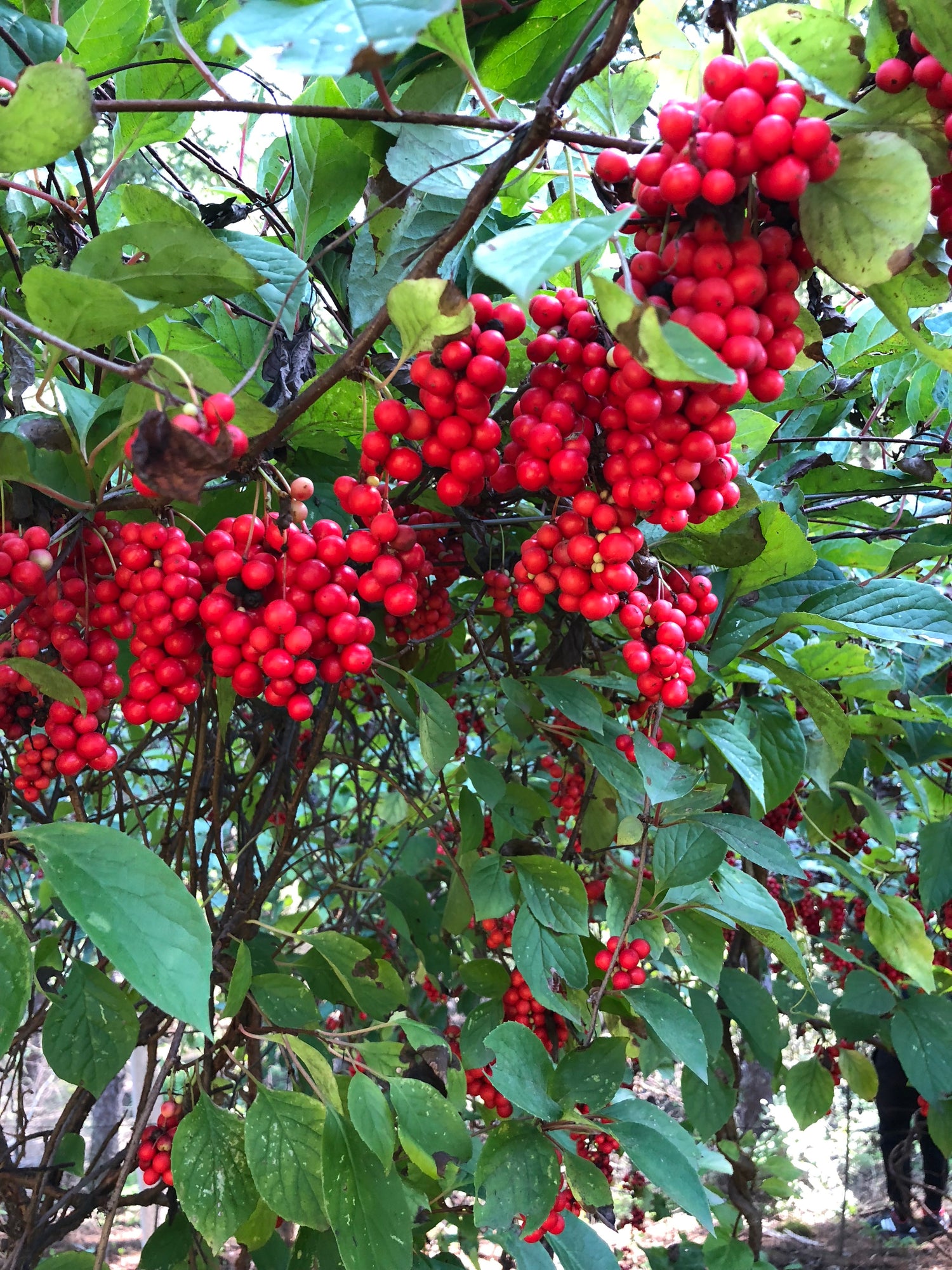
Botanical Overivew
- Botanical Name: Schisandra chinensis
- Family: Schisandraceae family (woody vines and shrubs that are often used in Traditional Chinese Medicine)
- Common Names: Schisandra berry, five flavor berry, Wu Wei Zi (Chinese name), Magnolia vine
- Location/Cultivation: Northern China (Heilongjiang and Hebei provinces)
What is Schisandra Berry?
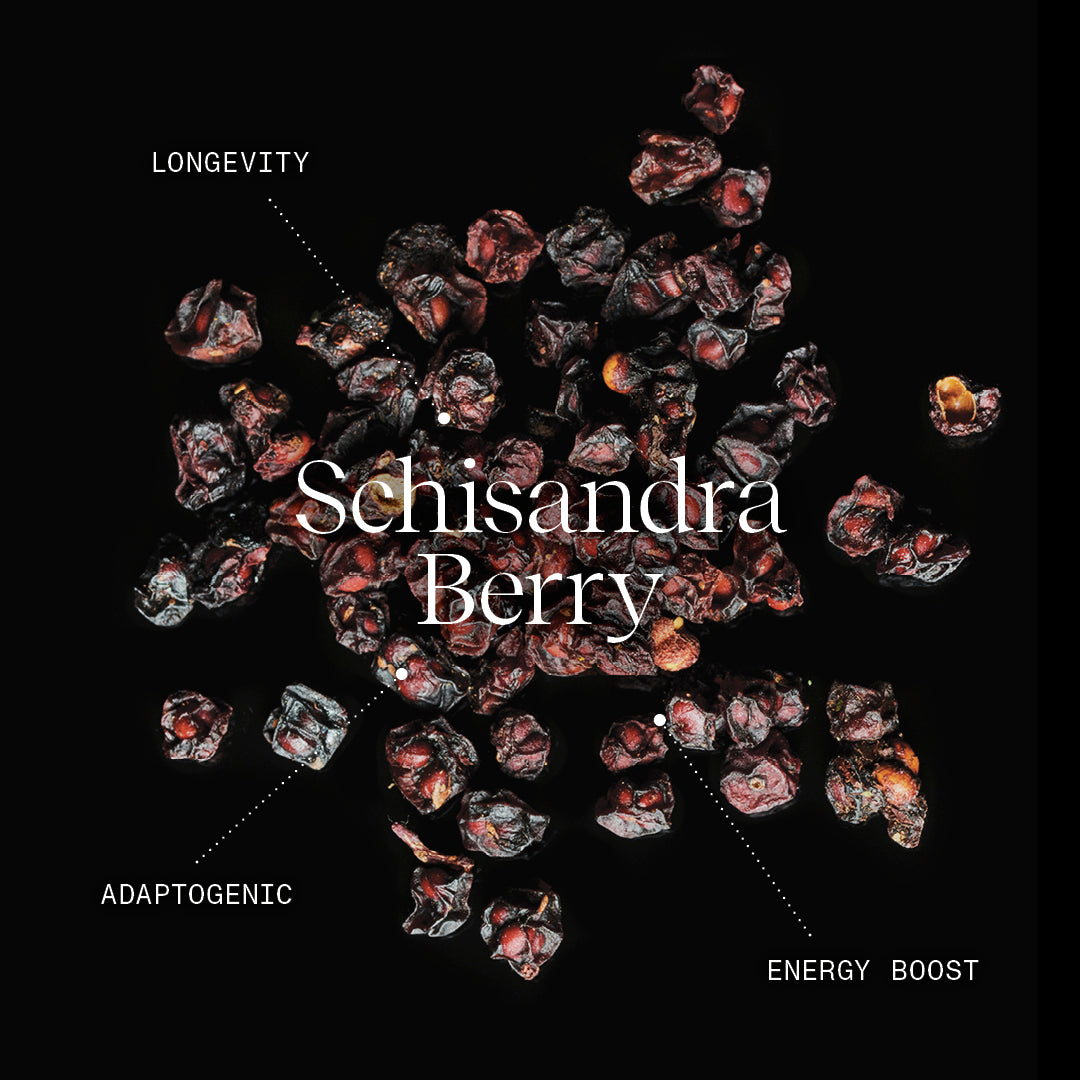
Known as the “five flavor berry” and a favorite in Traditional Chinese Medicine, Schisandra has been explored to aid in everything from liver detoxification to memory due to the rich antioxidant and anti-inflammatory properties of the berry.
This woody vine, scientifically named Schisandra chinensis, produces tiny, vibrant red to purple clusters, much like grapes, in Northern China (as well as Russia and Korea). In Rasāsvāda Rose Bergamot, the powerhouse duo of ginseng and Schisandra work together to help immune response and cognitive function.
History of Schisandra Berry
The Schisandra berry’s earliest official documentation dates back over 4,000 years to the Shennong Bencao Jing, an ancient Chinese pharmacopeia; however, researchers note that it may have been used for about 15 centuries, second only to ginseng, in Traditional Chinese Medicine. Schisandra, or Wu Wei Zi, was believed to “calm the heart and quiet the spirit,” support liver health, sharpen the mind, and increase endurance.
Around 1850, scientists cultivated Schisandra in eastern Russia, validating the berry’s potency in mid-20th century studies. They used Schisandra to enhance stamina and mental clarity in soldiers, athletes, and cosmonauts.
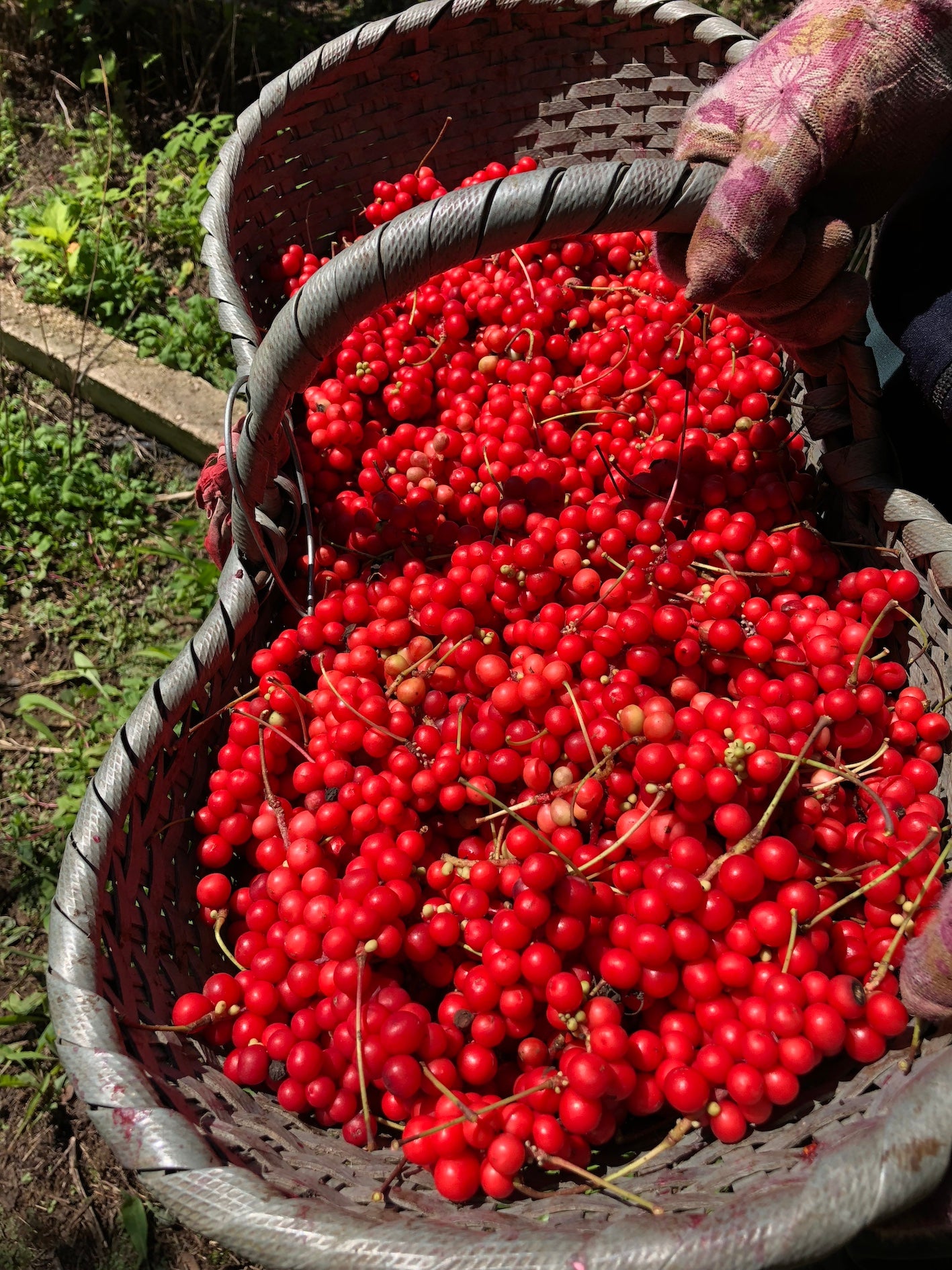
What does “Five Flavors” mean?
Schisandra is renowned for its unique combination of flavors that correspond to the five elements of traditional Chinese medicine: sour (wood), bitter (fire), sweet (earth), acrid (metal), and salty (water). Because it encompasses all five tastes, the berry is known to support the five yin: heart, lungs, spleen, liver, and kidneys.
This blend is what makes it beloved (and used extensively) in Traditional Chinese medicine, often referred to as a “harmonizer” or harmonizing tonic due to its balanced nature.
The skin has an aromatic citrus flavor while the pulp mirrors that of a cranberry: tart and cidery. The seeds are bitter, however, after the Rasāsvāda’s special brewing technique—applied to adaptogenic roots, fruits, and bitter barks— there is a bright fruity, floral flavor and a smooth ‘mouth feeling,’
Health Benefits of Schisandra Berry
Known as an all around “superberry” in Chinese medicine, Schisandra has antioxidant and anti-inflammatory properties. Studies have shown its potential to regulate a variety of endocrine and metabolic systems, improve digestion, normalize blood pressure and glucose, and alleviate anxiety. Additionally, it has been used to alleviate menopausal symptoms like hot flashes and night sweats.
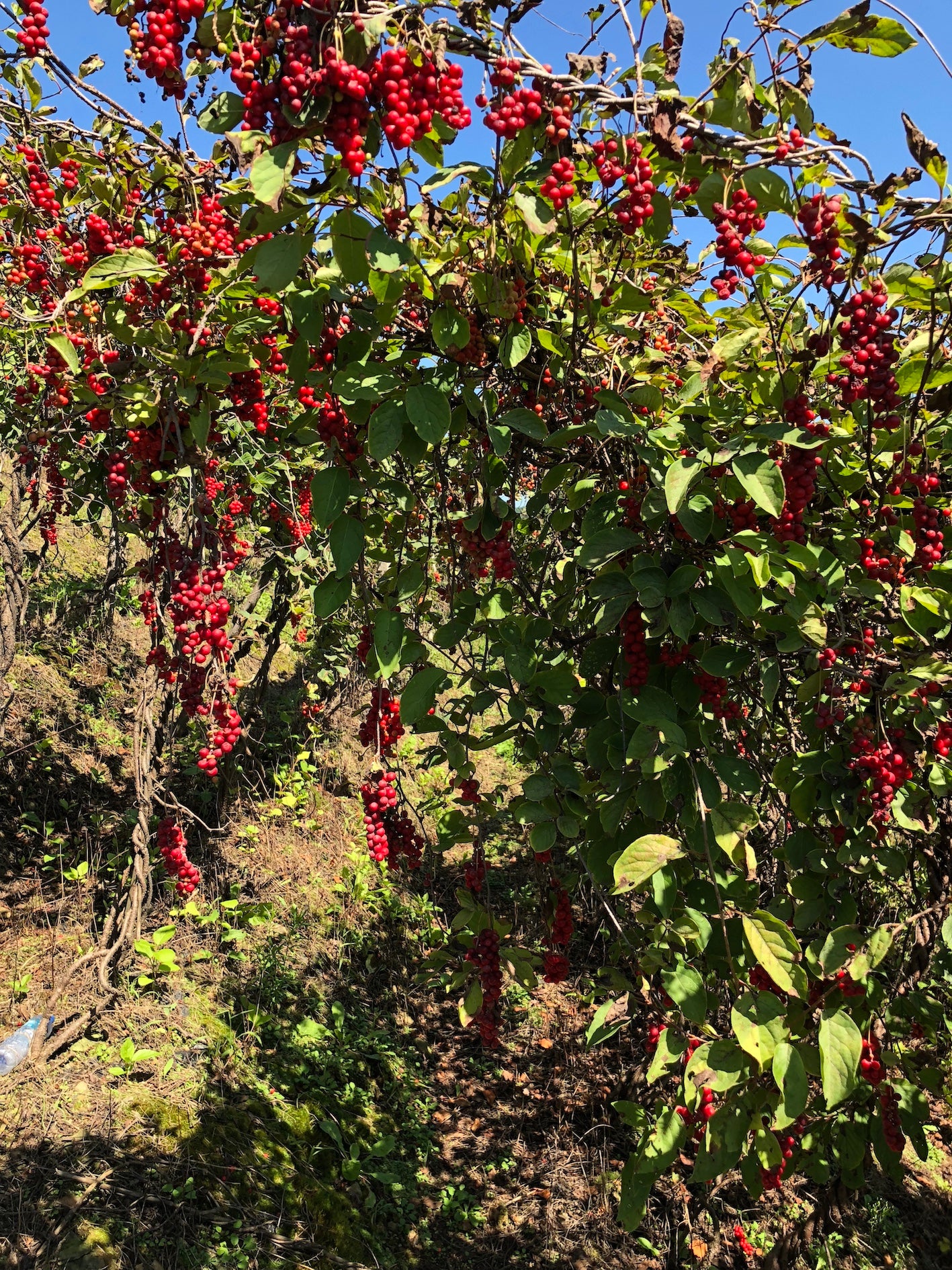
The Three As: Adaptogenic, Antioxidant, and Anti-Inflammatory
Schisandra is composed of multiple bioactive compounds (antioxidants called lignans) that provide adaptogenic, antioxidant, and anti-inflammatory properties.
1. Adaptogenic Properties
Adaptogens are remarkable natural substances found in certain plants and help the body adapt to stress, support normal metabolic function, and help restore systemic equilibrium. Unlike stimulants, which provide a short-term lift, adaptogens promote long-term balance by enhancing endurance, mental clarity, and overall resilience.
Some studies suggest that schisandra may ease physical fatigue, making it a good choice for athletes.
2. Anti-Aging and Antioxidant
Protects against oxidative stress and supports cellular health.
Schisandra berries are rich in antioxidants like lignans, flavonoids, and vitamins C and E, which help neutralize free radicals, which can lead to cell damage that is associated with aging and certain diseases. .
3. Anti-Inflammatory
Balances inflammation, promoting better health and recovery.
Schisandra possesses significant protective anti-inflammatory activity and is considered one of the most protective medicinal plants. It also supports the skin barrier, and it may promote a balanced immune system.
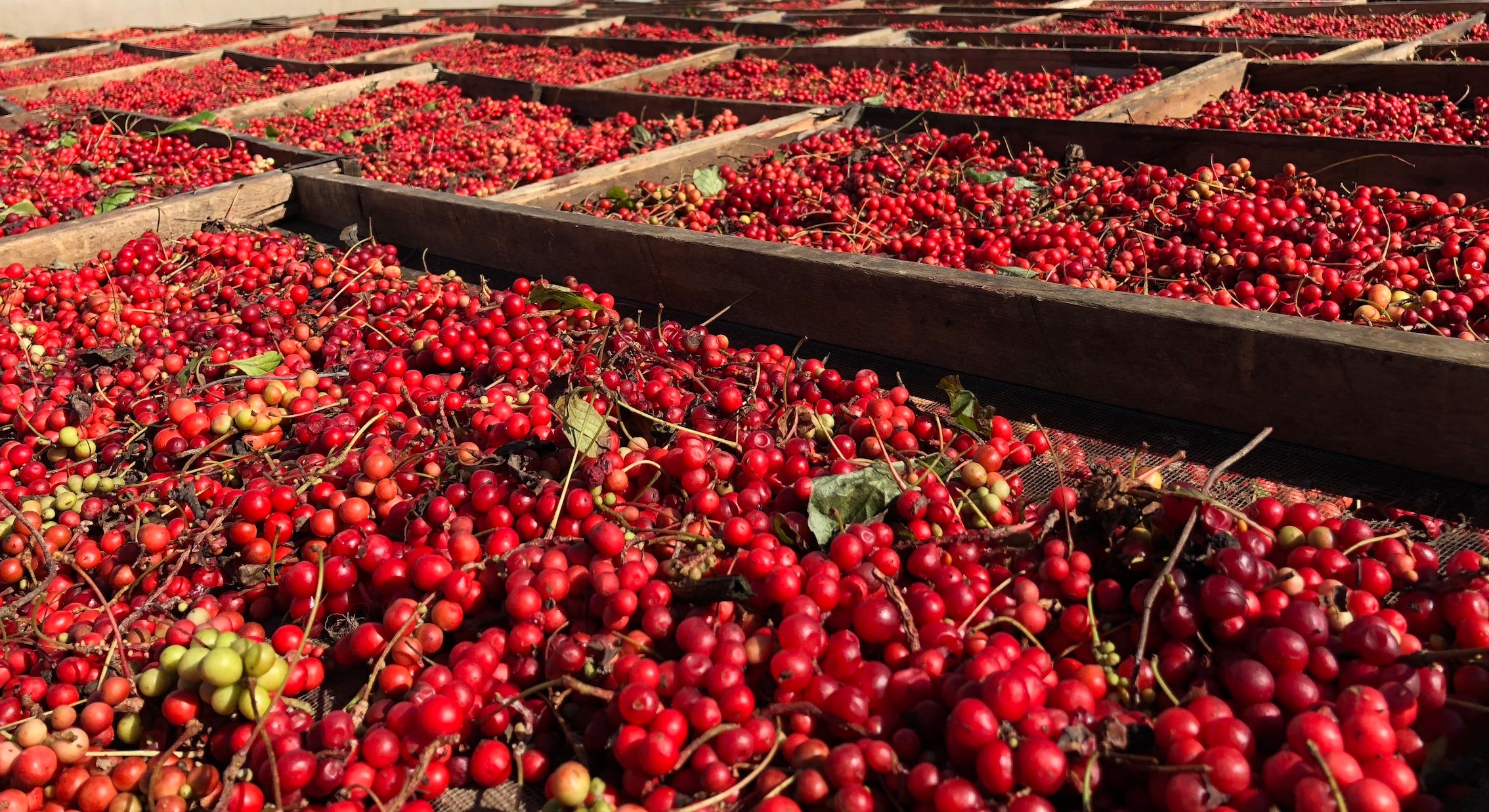
What Does Schisandra Do for the Body?
From the brain to essential organs, Schisandra berry has a list of benefits to the whole body.
1. Brain Health: Enhances cognitive function and supports mental clarity.
The berry is known as a “neuroprotective” agent, supporting both cognitive activity and memory, as it may help balance stress hormones like cortisol.
2. Liver support: Aids in detoxification and supports liver health.
Studies in mice, as cited by David Winston in his book Adaptogens: Herbs for Strength, Stamina and Stress Relief, have shown Schisandra protects against liver damage. Additionally, one study in Beijing from 2021 noted: “The most important pharmacological effects of [Schisandra] are…liver protection and anti-carcinogenic effects.”
3. Vitality Boost: Increases energy levels and enhances physical performance.
Schisandra boosts energy levels as well. In traditional Chinese Medicine, this is more frequently described as “Qi” enhancement. According to one small study, the berry was also linked to greater muscle strength in women, a much-needed component of energy and performance.
Schisandra Berry in Rasāsvāda
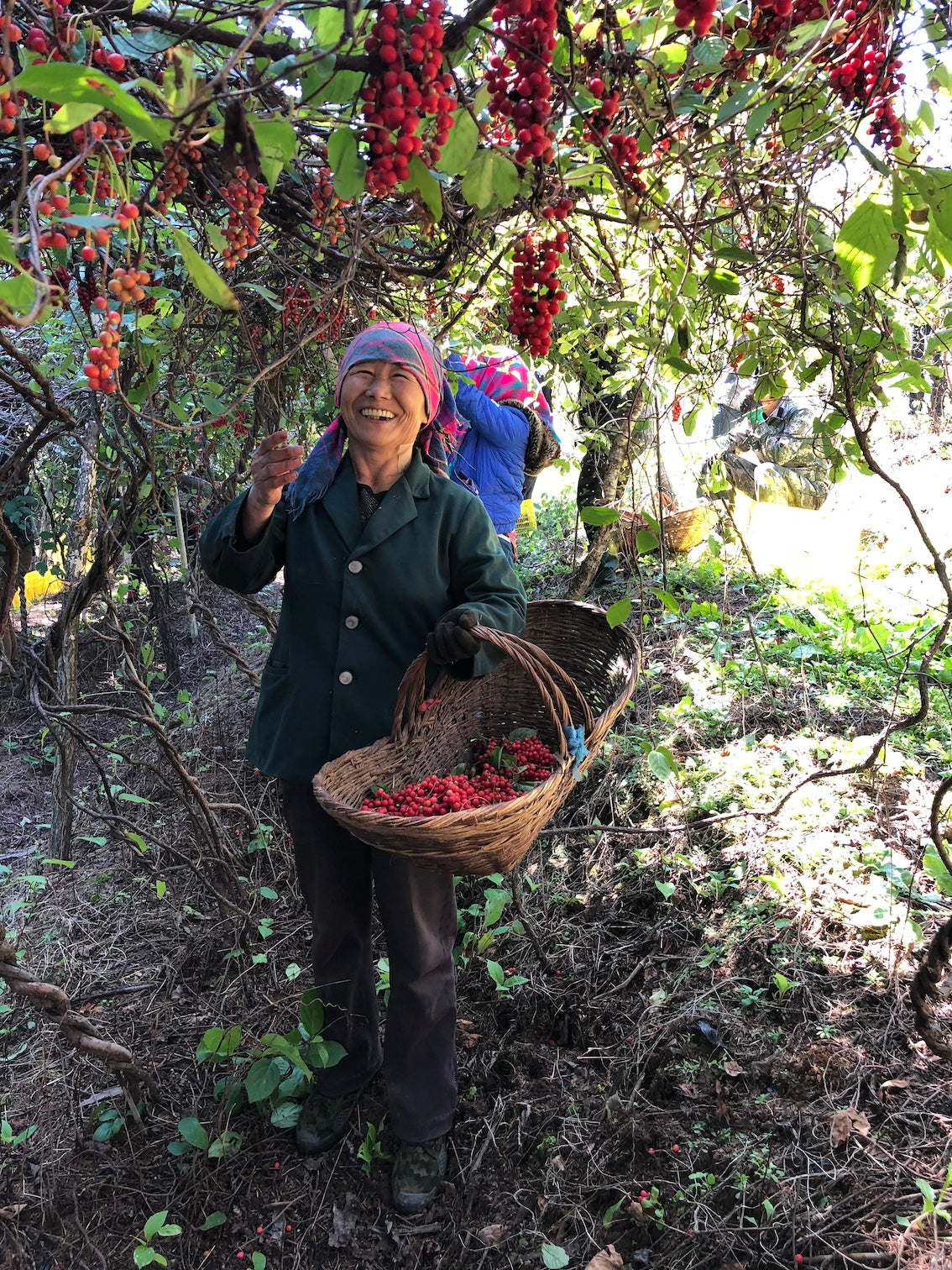
We selected schisandra berry as a key ingredient in both Rose Bergamot and Ruby Artemisia because of its powerful health supporting qualities.
We partner with growers, through Rishi Tea, who cultivate Schisandra Berry vines alongside the native forest in the hills of Jilin province, using a semi-wild crafting approach that yields exceptionally complex and nutrient-rich fruit.
Ready to experience the benefits of schisandra berry in your daily ritual? Explore Ruby Artemisia and Rose Bergamot and discover why this berry is redefining what it means to drink for your health.
Rose Bergamot
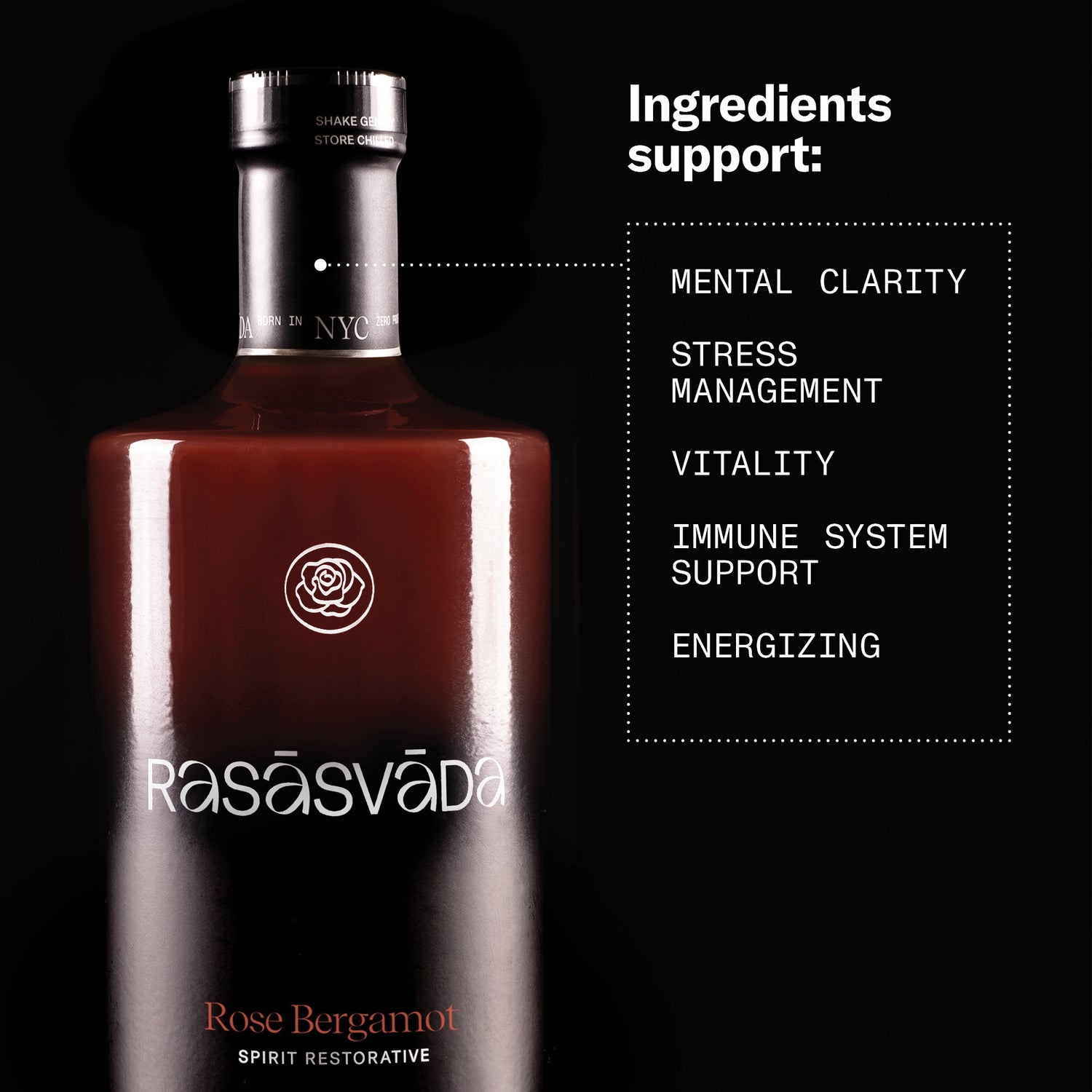
In Rose Bergamot, Schisandra berries compliment ginseng, essential oils, and vitamin C – all vetted ingredients with extensive knowledge in the medical community about their efficacy in stress relief and immune system support, to create a functional spirit designed to support mental clarity, stress resilience, and vitality.
Enjoy it by itself, with sparkling water, or in a cocktail or smoothie.
Ruby Artemisia

In Ruby Artemisia, Schisandra berry shine together with maqui berries, wormwood, Pu'er tea, and artichoke leaves, to create a complex and functional spirit, designed to support vitality, beauty, and metabolic balance from the inside out.
Enjoy it by itself, with sparkling water, or in a cocktail or smoothie.
Precautions
A diet rich in antioxidants like those found in maqui berries can help support overall health and longevity. Maqui berries are particularly high in beneficial antioxidants and may have numerous health benefits like protecting against cognitive decline, supporting eye health and tear production, promoting a healthy gut and healthy aging.
100% plants. 0% preservatives.

Discovery Pack
Try them all.
With the Discovery Set, you’ll receive a 375ml bottle of each of our three expressions, each one unique in flavor and function.
Everyone has a favorite—find yours.
100% Plants. 0% Preservatives.
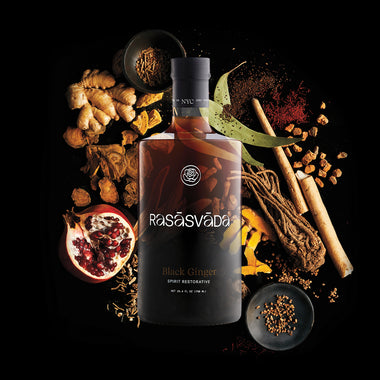
- Natural cleansing
- Libido support
- Recovery
Bold, bittersweet, and earthy.
Hero ingredients: Black ginger, burdock root, cardamom, Meshima mushroom, Reishi mushroom + 13 other plants.
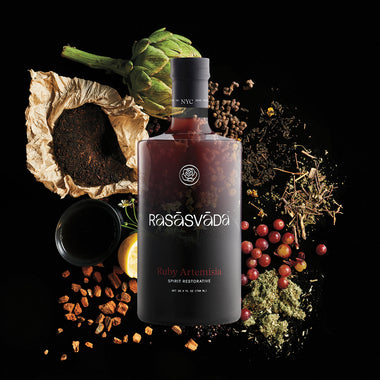
- Longevity
- Skin health
- Gut health
Bright, tart, and slightly sweet.
Hero ingredients: Maqui berry, wormwood, Yunnan Pu'er tea, artichoke leaves, red wine grape skins + 10 other plants.
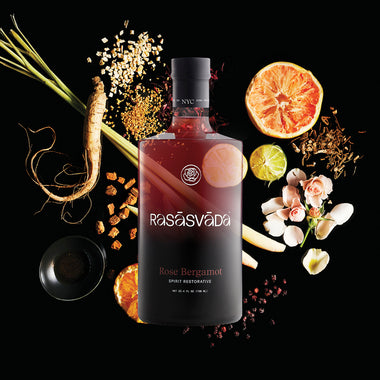
- Mental clarity
- Stress management
- Vitality
Floral, rare citrus, and bitter.
Hero ingredients: Schisandra berry, ginseng, bergamot citrus, Angelica archangelica, rose petals + 10 other plants.
Sources
- Amasi-Hartoonian, N., Sforzini, L., Cattaneo, A., & Pariante, C. M. (2022). Cause or consequence? Understanding the role of cortisol in the increased inflammation observed in depression. Current Opinion in Endocrine and Metabolic Research, 24, 100356. https://doi.org/10.1016/j.coemr.2022.100356
- Chiu, H., Chen, T., Tzeng, Y., & Wang, C. (2012). Improvement of liver function in humans using a mixture of schisandra fruit extract and sesamin. Phytotherapy Research, 27(3), 368–373. https://doi.org/10.1002/ptr.4702
- Ci, X., Ren, R., Xu, K., Li, H., Yu, Q., Song, Y., Wang, D., Li, R., & Deng, X. (2009). Schisantherin A exhibits anti-inflammatory properties by Down-Regulating NF-ΚB and MAPK signaling pathways in Lipopolysaccharide-Treated RAW 264.7 cells. Inflammation, 33(2), 126–136. https://doi.org/10.1007/s10753-009-9166-7
- Herbs, I. (2020). Schisandra Benefits. Indigo Herbs: https://www.indigo-herbs.co.uk/natural-health-guide/benefits/schisandra
- Hu, D., Cao, Y., He, R., Han, N., Liu, Z., Miao, L., & Yin, J. (2012). Schizandrin, an Antioxidant Lignan fromSchisandra chinensis,Ameliorates Aβ1–42-Induced Memory Impairment in Mice. Oxidative Medicine and Cellular Longevity, 2012, 1–7. https://doi.org/10.1155/2012/721721
- Kang, Y., Han, M., Hong, S., Park, C., Hwang, H., Kim, B. W., Kyoung, K. H., Choi, Y. W., Kim, C. M., & Choi, Y. H. (2014). Anti-inflammatory Effects of Schisandra chinensis (Turcz.) Baill Fruit Through the Inactivation of Nuclear Factor-κB and Mitogen-activated Protein Kinases Signaling Pathways in Lipopolysaccharide Stimulated Murine Macrophages. Journal of Cancer Prevention, 19(4), 279–287. https://doi.org/10.15430/jcp.2014.19.4.279
- Kim, Y., Yoo, S., Chae, C., Jung, U. J., & Choi, M. (2014). OmijaFruit extract improves endurance and energy metabolism by UpregulatingPGC-1Α expression in the skeletal muscle of exercised rats. Journal of Medicinal Food, 17(1), 28–35. https://doi.org/10.1089/jmf.2013.3071
- Kopustinskiene, D. M., & Bernatoniene, J. (2021). Antioxidant Effects of Schisandra chinensis Fruits and Their Active Constituents. Antioxidants, 10(4), 620. https://doi.org/10.3390/antiox10040620
- Ko KM, Chiu PY. Biochemical basis of the "Qi-invigorating" action of Schisandra berry (wu-wei-zi) in Chinese medicine. Am J Chin Med. 2006;34(2):171-6. doi: 10.1142/S0192415X06003734. PMID: 16552829.
- Malík, M., & Tlustoš, P. (2023b). Nootropic herbs, shrubs, and trees as potential cognitive enhancers. Plants, 12(6), 1364. https://doi.org/10.3390/plants12061364
- Nowak, A., Zakłos-Szyda, M., Błasiak, J., Nowak, A., Zhang, Z., & Zhang, B. (2019). Potential of Schisandra chinensis (Turcz.) Baill. in Human Health and Nutrition: A Review of Current Knowledge and Therapeutic Perspectives. Nutrients, 11(2), 333. https://doi.org/10.3390/nu11020333
- Panossian, A., & Wikman, G. (2008). Pharmacology of Schisandra chinensis Bail.: An overview of Russian research and uses in medicine. Journal of Ethnopharmacology, 118(2), 183–212. https://doi.org/10.1016/j.jep.2008.04.020
- Panossian, A., & Wikman, G. (2009). Evidence-Based Efficacy of Adaptogens in Fatigue, and Molecular Mechanisms Related to their Stress-Protective Activity. Current Clinical Pharmacology, 4(3), 198–219. https://doi.org/10.2174/157488409789375311
- Park, H. J., Lee, S., Song, Y., Jang, S., Ko, Y., Kang, S. N., Chung, B. Y., Kim, H., Kim, G., & Cho, J. (2014). Schisandra chinensisPrevents Alcohol-Induced fatty liver disease in rats. Journal of Medicinal Food, 17(1), 103–110. https://doi.org/10.1089/jmf.2013.2849
- Park, J. Y., & Kim, K. H. (2016). A randomized, double-blind, placebo-controlled trial of Schisandra chinensis for menopausal symptoms. Climacteric, 19(6), 574–580. https://doi.org/10.1080/13697137.2016.1238453
- Park, J., Han, S., & Park, H. (2020). Effect of Schisandra chinensis Extract Supplementation on Quadriceps Muscle Strength and Fatigue in Adult Women: A Randomized, Double-Blind, Placebo-Controlled Trial. International Journal of Environmental Research and Public Health, 17(7), 2475. https://doi.org/10.3390/ijerph17072475
- Patani, A., Balram, D., Yadav, V. K., Lian, K., Patel, A., & Sahoo, D. K. (2023). Harnessing the power of nutritional antioxidants against adrenal hormone imbalance-associated oxidative stress. Frontiers in Endocrinology, 14. https://doi.org/10.3389/fendo.2023.1271521
- Rusu, M. E., Fizeșan, I., Vlase, L., & Popa, D. (2022). Antioxidants in Age-Related Diseases and Anti-Aging Strategies. Antioxidants, 11(10), 1868. https://doi.org/10.3390/antiox11101868
- Schisandra. (2022, June 3). Memorial Sloan Kettering Cancer Center. https://www.mskcc.org/cancer-care/integrative-medicine/herbs/schisandra
- Son, Y., Yang, W., Park, S., Yang, J., Kim, S., Lyu, J., & Kim, H. (2023). The Anti-Inflammatory and Skin Barrier Function Recovery Effects of Schisandra chinensis in Mice with Atopic Dermatitis. Medicina, 59(7), 1353. https://doi.org/10.3390/medicina59071353
- Sun, Wenli et al. “Schisandra chinensis, Five Flavor Berry, a Traditional Chinese Medicine and a Super-Fruit from North Eastern China.” Pharmacognosy Communications 11 (2021): 13-21. https://phcogcommn.org/content/289
- Tan, B. L., Norhaizan, M. E., Liew, W., & Rahman, H. S. (2018). Antioxidant and Oxidative stress: A mutual interplay in Age-Related Diseases. Frontiers in Pharmacology, 9. https://doi.org/10.3389/fphar.2018.01162
- Tea, R. (2021, July 8). Schisandra Berry. Rishi Tea & Botanicals. https://rishi-tea.com/blogs/journal/schisandra-berry?srsltid=AfmBOoq9_tL0DTFunHuEFVb0o92ZlM2LW4Txy2pjuVaJkoDEdXvoWCYT
- Tvrdá, E., Michalko, J., Árvay, J., Vukovic, N. L., Ivanišová, E., Ďuračka, M., Matušíková, I., & Kačániová, M. (2020). Characterization of the Omija (Schisandra chinensis) Extract and Its Effects on the Bovine Sperm Vitality and Oxidative Profile during In Vitro Storage. Evidence-based Complementary and Alternative Medicine, 2020(1). https://doi.org/10.1155/2020/7123780
- Vitamin C. (n.d.). Mayo Clinic. https://www.mayoclinic.org/drugs-supplements-vitamin-c/art-20363932
- Winston, D. (2019). Adaptogens: Herbs for Strength, Stamina, and Stress Relief. Healing Arts Press.
